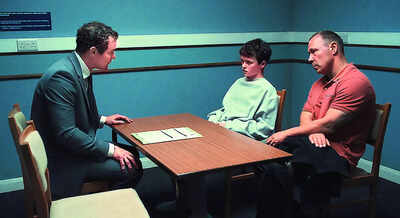- News
- entertainment
- bengali
- movies
- Clueless adults and conflicted teens: Why Adolescence is a wake-up call
Trending
Clueless adults and conflicted teens: Why Adolescence is a wake-up call
The limited web series, Adolescence, highlights the impact of parenting gaps in the digital age, underscoring the dangers of unsupervised Internet access. The series has sparked vital discussions on the real-world consequences of online interactions, emphasizing the need for digital literacy and open conversations among parents and educators.
The four-episode limited web series, Adolescence, has created quite a flutter since it started streaming on March 13, with parents and experts lauding the way it has captured the impact of parenting gaps during a young teen’s formative years in the digital age, and the dangers posed by unsupervised access to the Internet. It has reignited discussions on how online interactions can have real-life consequences, emphasising the urgent need for awareness and intervention. Even though social media platforms try to curb these issues through content filters, reporting mechanisms, and safety tools, their effectiveness remains limited. The responsibility, therefore, extends to parents and educators, who play a crucial role in fostering digital literacy, open conversations, and boundary-setting.
We spoke to experts, parents and youngsters who have watched the series for their understanding of the red flags and how to address them.
‘Social exclusion and microaggression, a reality’
An exclusion, a joke at someone’s expense, or the way people talk - telling your teacher about harassment does not always help. There are no real conversations on dealing with it – Bidushi Khaitan, 16, Kolkata
There is a scene where Jamie absorbs his father’s microaggressions, learning that dominance equals strength. That’s how it starts. If you admit to being bullied - you’re lower in the power hierarchy – Avik Saha, 19, Mumbai
‘Adolescents seek peer group validation’
As a viewer, I realised, no matter what the parents did in the show, something would always be left undone. The real issue is that we don’t control what our children are exposed to – in school, peer groups, or online – Debarati Banerjee, independent psychologist, Kolkata
Adolescents today don’t identify with their family much; their main validation comes from their peer groups and online. In fact, issues where a minor is targeting or is being targeted isn’t an urban problem; we hear a lot of it from rural areas as well. It has to do with the accessibility to unfiltered content online – Arpitha Mirchandani, senior psychologist who deals with adolescence psychology, Bridge Health
‘Many red flags are visible in school’
Almost all children today have smartphones and are exposed to a virtual world, with its toxic influencers like Andrew Tate. Their world is alien to us adults. But many red flags are visible in school, which is a microcosm of society. From bullying to toxic masculinity – all these are evident. I feel as parents, we can address these issues if we are receptive to the teachers’ feedback
– Shruti Bhattacharjee, parent, Kolkata
The toxic online subcultures the show has highlighted
·
Incel culture:
It’s a subculture of individuals identifying as “involuntary celibates” (incels), who often express frustration and anger over their inability to form romantic or sexual relationships, particularly with women. It’s largely driven by online communities where members share their grievances, blame others for their lack of success in relationships, and often promote misogynistic views·
Digital radicalisation:
Vulnerable adolescents, like the protagonist Jamie, can be radicalised by extremist online subcultures. The extremism can range from deeply personal, perceived sexual inadequacy, to a much broader scope of religious and racial bigotry·
Manosphere:
A collective term for online communities that foster anti-feminist and often misogynistic rhetoric. This term is central to understanding how digital subcultures can negatively shape the views of young men·
Echo chambers:
Teenagers can become trapped in what are termed online “echo chambers”, where they only encounter like-minded individuals, reinforcing toxic beliefs·
Toxic masculinity:
Young adolescents could be struggling with emotional repression and be ashamed to speak of their vulnerability, especially if they have a hypermasculine role model at home – like Jamie’s father in the show
Is your teenager being brought up by the Internet?*
Completely restricting Internet access can have a forbidden fruit kind of an effect, likely to make teenagers secretive. Parents should instead teach them how to identify content, filter realities and misinformation. Parents should also ensure that the teenager can reach out to them when they make a mistake. Other measures they can take are…
·Limit screen time
·Teach them to self-reflect, and spend time journaling
·Encourage thinking before commenting, or engaging in something online
·Give them space for them to understand and choose the right action
·Right from the toddler stage, parents should be watchful of the content they are exposing their child to, including the kind of cartoons they are watching
·Instead of just feeding them knowledge, they need to be taught life skills
·Parents should keep themselves updated with the changing needs and lifestyles
"A key issue is the lack of control over children’s online exposure. By the time parents notice, many children are already addicted – to social media, to gaming. They withdraw, and often develop anxiety, depression, or avoid school. Sadly, many parents fail to spot these red flags" – Archana Sagar, independent child and adolescent psychologist, Bangalore
Inputs by Arka das and Nandini Ganguly
End of Article
FOLLOW US ON SOCIAL MEDIA
Visual Stories
Tired of too many ads?










